|
 Secure Site
Secure Site
|
 |
Archive for the 'Well-being' Category
 Stretch and do Yoga with Your Chime Timer to Create a Wake Up routine in the Morning These energy-boosting changes to your daily routine will leave you feeling recharged.
Time to Wake Up!
Even if you’re a morning person, you’re probably far from firing on all cylinders when you first open your eyes. “It can take up to two hours to get the brain fully alert,” says Matthew Edlund, M.D., the director of the Gulf Coast Sleep Institute, in Sarasota, Florida, and the author ofThe Power of Rest: Why Sleep Alone Is Not Enough ($26, amazon.com). One reason you’re lethargic is that your core body temperature has dipped during the night to keep you in deep, restorative slumber. Try these morning energy strategies to get going with a lot less grief.
Let in the sun and stretch. Exposure to light stimulates your brain to stop producing melatonin (the hormone that helps induce sleepiness), says Edlund. Light also gets your body out of sleep mode by resetting the brain’s suprachiasmatic nucleus (a big name for a region about the size of a grain of rice), which controls the body’s circadian rhythms (or 24-hour biological clock). Meanwhile, Edlund says, “the first physical activity of the day raises the body temperature and increases blood flow to your brain.” Open the blinds, then try some stretches in front of the window. (If neighbors live in close range, make sure your pj’s are presentable.) Use your Zen Timepiece by setting it to count down in 20 minutes while you gently stretch and do a few yoga poses.
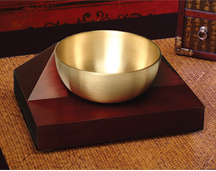 Chime Timer by Now & Zen with Tibetan-Singing Bowl Gong Get moving. A morning workout triggers feel-good endorphins and lowers elevated stress hormones. The effects can last six to eight hours, says Gregory Florez, a spokesperson for the American Council on Exercise, in Salt Lake City: “Morning exercisers tend not to have midmorning slumps and are sharper mentally than if they hadn’t exercised.” You’ll get the most bang for your energy buck, he says, with a workout that includes both cardio and strength training.
Look at something you love. Mornings are especially hard because we’re in survival mode, says Jim Loehr, Ed.D., a cofounder of the Human Performance Institute, in Orlando, Florida. We have to meet basic needs, like hunger and thirst, and to the body that feels as if we’re under threat, which saps our energy. Positive emotions, like hope and gratitude, fight that energy drain by counteracting the primal messages that we’re in some kind of danger. Loehr suggests kick-starting those positive emotions by looking at something meaningful: Next to your bed, place a treasured photo, flowers, or anything else you’re grateful to see.
Shake up your routine. The brain responds to novel experiences by releasing a rush of neurotransmitters, such as dopamine, which make you more alert. No need for a morning cliff dive—just take something ordinary and switch it up: If you’re right-handed, use your left hand to brush your teeth.
By Amy Paturel and Sara Reistad-Long from RealSimple.com
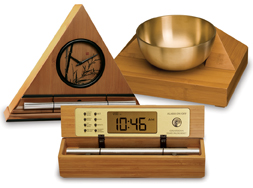 Chime Timers and Clocks for A Gradual Awakening Now & Zen Headquarter Store
1638 Pearl Street
Boulder, CO 80302
(800) 779-6383
Posted in Chime Alarm Clocks, Now & Zen Alarm Clocks, wake up alarm clock, Well-being, Yoga Timer, Yoga Timers by Now & Zen
Our Zen Timepiece’s acoustic 6-inch brass bowl-gong clock is the world’s ultimate alarm clock, practice timer, and “mindfulness bell.”
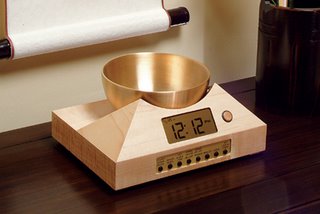 How to Decorate with Clocks
It fills your environment with beautifully complex tones whenever it strikes. In the morning, its exquisite sounds summon your consciousness into awakening with a series of subtle gongs that provide an elegant beginning to your day. Once you experience the Zen Timepiece’s progressive awakening, you’ll never want to wake up any other way. It also serves as the perfect meditation timer. Available in 5 wood styles.
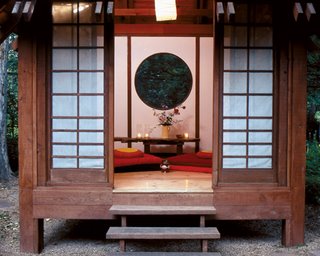 A Zen-like Clock helps Make Living Spaces More Zen Now & Zen Chime Clock Store
1638 Pearl Street
Boulder, CO 80302
(800) 779-6383
Posted in Bamboo Chime Clocks, Now & Zen Alarm Clocks, Well-being, Zen Alarm Clock
 yoga to calm your mind Yoga is a great way to deal with stress—and research backs it up. According to a recent study by the Boston University School of Medicine, any variety of yoga may increase brain levels of the neurotransmitter gamma-aminobutyric acid (GABA), which is associated with relaxation and lowered anxiety. If you’re struggling with an anxiety disorder, try easing it with restorative yoga—the kind that uses pillows or blankets to support your body and allow you to relax deeply in every pose.
A good source for restorative poses is Relax and Renew: Restful Yoga for Stressful Times (Rodmell Press, 1995) by Judith Hanson Lasater. Other helpful poses, says Bo Forbes, founder of the Boston-area Center for Integrative Yoga Therapeutics, include Supported Child’s Pose and Supported Reclining Twist. Practice in a dim, quiet room to cut down on sensory stimulation, and use two-to-one breathing: exhaling for twice as long as you inhale.
For even better results, follow your restorative practice with eight to ten minutes of relaxed, even breathing from your diaphragm (be sure to set your Zen Yoga Timer so that you know when to end your practice), suggests yoga expert Rolf Sovik, Psy.D., director of the Himalayan Institute in Buffalo, N.Y., and author of Moving Inward: The Journey to Meditation (Himalayan Institute Press, 2005). “Breathing calms the nervous system and decreases the impact of anxiety.”
The perfect position for relaxed breathing is Crocodile Pose, Sovik adds. If you have a blanket, roll it into a “Tootsie Roll” shape, fold that into a long horseshoe, and prop it so when you lie on it, chest down, the round end is under your chin and the sides are propping up your chest. A pillow can go under your forehead. This should allow your abdomen to remain relaxed, your lower back to rise and fall, and your rib cage to move freely. Set your Yoga Timer from Now & Zen to chime in five minutes and continue your breathing until it sounds.
adapted from Natural Solutions Magazine, November 2007 by Ben Kallen
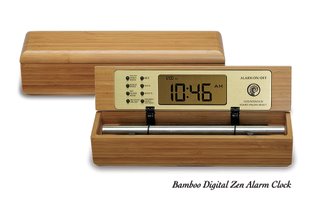 Zen Yoga Timer in Bamboo with Natural Acoustic Chime Our Yoga Timer with Chime also serves as a countdown and interval timer for yoga, meditation, bodywork, etc.; and it can also be set to chime on the hour as a tool for “mindfulness.”
Now & Zen’s Yoga Timer Store
1638 Pearl Street
Boulder, CO 80302
(800) 779-6383
Posted in intention, mindfulness practice, Well-being, yoga, Yoga Timer, Yoga Timers by Now & Zen
 snooze news from Now & Zen, Inc. New research shows that getting a good night’s rest can do more than help you feel your best the next day—it can also reduce your risk of developing diabetes. Scientists at the University at Buffalo found that people who sleep fewer than six hours a night during the work week are 4.5 times more likely to have elevated levels of blood sugar than those who snooze six to eight hours.
Why? “Inadequate sleep activates the sympathetic nervous system, which can lead to insulin resistance and glucose intolerance,” says Lisa Rafalson, research assistant professor at the University at Buffalo and author of the study. “Lack of sleep may also cause us to eat more, and being overweight is a strong risk factor for diabetes.”
adapted from Natural Solutions, August 2009
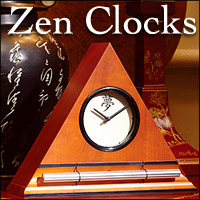 Chime Clocks for a Natural Awakening
Now & Zen’s
Clock Store
1638 Pearl Street
Boulder, CO 80302
Posted in Chime Alarm Clocks, Japanese Inspired Zen Clocks, Natural Awakening, Now & Zen Alarm Clocks, Progressive Awakening, Well-being
 wake up your body in the morning Start Your Morning with Some Simple Stretching to increase your circulation
Together, movement and breath will increase circulation, stimulate your nerve centers, and bathe your body in the oxygen that it needs to feel alert. You can’t hurry the process of getting the body ready to move in the morning, however. According to Maas, your internal temperature is lower in the morning and can’t support intense aerobic activity right away. Rather, go with simple exercises designed to get your energy flowing. Adds Novie, “The goal is to align your breath with your body by making movement and breath simultaneous.”
Breathe with abundance. Active breathing uses a faster paced, more intense breath, says Novie. “This method of breathing is said to purify the blood. It gets the fire going in the body.” Novie suggests beginning with three rounds of bellows breathing, in which the length of the inhalation equals that of the exhalation. Start out slowly if you’re new to this kind of breathing, gradually working up to a faster pace. Try for 15 breaths, but stop if you feel light-headed. Eventually set your Zen Timer with Gong for 5 minutes and breath for this amount of time and then gradually increase the time.
Open up the body with a cat/cow exercise. Begin on your hands and knees. Moving slowly and carefully, lift up your head, sway your back (like a cow’s), and take a deep breath through your nose, filling your lungs with air. Then drop your head and round your back like a cat, pulling your belly in and exhaling. Return to cow position and then slowly drop back on your heels and exhale into Child’s pose, resting your torso between your knees, forehead on the floor. Return to your hands and knees to inhale, and repeat.
Stretch out with a half sun salute. Begin in Mountain pose, standing with your feet together and arms by your sides. As you inhale deeply, bring your arms up over your head. Then as you exhale, bend your torso forward, sweeping your arms down until your fingertips rest on the ground just in front of you (or on your calves if you can’t reach comfortably). Now straighten your spine and look up, taking a deep breath in; then exhale and drop your head down again.
Once you experience the Zen Timepiece’s progressive awakening, you’ll never want to wake up any other way. It also serves as the perfect meditation timer.
adapted from Body + Soul Magazine, March 2006
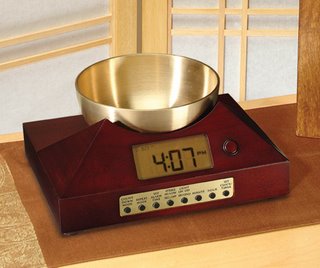 Zen Timepiece with brass singing bowl, a meditation timer
Now & Zen’s Clock Store
1638 Pearl Street
Boulder, CO 80302
(800) 779-6383
Posted in Natural Awakening, Now & Zen Alarm Clocks, sleep, Sleep Habits, Well-being
 How do you make time for what matters most? Now & Zen, Inc., based in Boulder, Colorado, is an Alarm Clock Company founded in 1995 by artist and entrepreneur Steve McIntosh. Now & Zen’s mission is to participate in the emerging movement in society toward a more spiritually focused lifestyle. Our shorthand way of describing this lifestyle is “quality of thought and stillness of being”. These complimentary aspects of spiritual living are described below.
Quality of thought
The idea of quality of thought applies to the holistic or “integral” perspective by which we consider the full impact of our choices and actions. Quality thinking is value driven and concerned with the welfare of the greatest relevant whole—our whole selves, our whole environment, and our whole society. Quality of thought is another way to refer to the practice of the “golden rule”—our concern for the common good.
Quality of thought also embraces the insights of cutting edge science as well as ancient wisdom from diverse traditions. While a spiritual lifestyle extends far beyond “thought,” we must use our minds to recognize the movement of spirit in the world. Now & Zen’s Alarm Clocks embody quality of thought through their use as tools for education and transformation, in the esoteric principles used in their design, and in their beauty and originality.
Stillness of Being
 v Perhaps the most important aspect of spiritual living is feeling the presence of the Sacred, however we define it. Cultivating a stillness practice such as meditation or prayer can be a powerful way to feel the presence of spirit. Stillness of being is also about inner peace and faith in a higher power. Just as quality of thought is about seeking for truth—the yang aspect of a spiritual life, stillness of being involves the yin principle of receptivity. It is in the state of stillness that the blessings of spirit are most fully received.
Now & Zen products embody stillness of being by helping to reduce stress and through the use of images of peace, such as the raked sand from a Zen garden and similar peaceful images used for our clock dial faces.
Ultimately, a spiritual lifestyle can be defined as any path that leads to spiritual experience. And as we understand it, spiritual experience is about beauty, truth and goodness. We thus strive to bring quality of thought and stillness of being to all Now & Zen products by making each one beautiful, true, and good: Every Now & Zen’s Alarm Clocks are designed to be beautiful to the eye and ear; all of our product claims are true—scientifically accurate and philosophically reasonable; and all of our products are “good for something,” that is, useful in our daily lives and not merely decorative or symbolic.
 quality of thought, stillness of being Now & Zen Headquarter Store
1638 Peal Street
Boulder, CO 80302
(800) 779-6383
Posted in Goodness, mindfulness practice, Natural Awakening, Well-being
 progressive awakening Waking up in the morning is a metaphor for life — a kind of daily microcosmic reenactment of our overall purpose for being in the world. That is, just about every religious tradition emphasizes spiritual growth. And the connection between “awakening” and spiritual growth can be found in practically all forms of spiritual teaching.
So if waking up in the morning really is a metaphor for our larger spiritual lives, this perspective might help us treat our morning ritual of getting out of bed as a kind of spiritual practice. Indeed, when approached in this way, how we wake up in the morning can make a larger difference in our lives overall.
 waking up
Perhaps this is stretching the matter, but there are many people who do recognize that something as simple as waking up in the morning can be an authentic form of spiritual practice. For those who don’t have to go to work or get the kids to school, waking up naturally, whenever their body feels like it, can be a wonderful version of this practice. Waking up without an alarm, whenever your body has had enough rest, is probably the healthiest option, and the one that will leave us feeling most refreshed and ready to start the day.
However, there are few of us that have this luxury, especially during the week.
Fortunately, for those who want to wake up right, without being startled awake by an annoying alarm or some radio DJ, there is The Zen Alarm Clock. This clock was designed to make waking up a kind of spiritual practice.
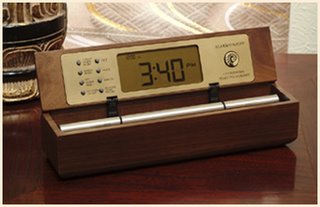 Digital Zen Alarm Clock
The Zen Clock wakes users with a built-in 10 minute gradual progression of acoustic chimes. And this gradual form of “progressive awakening” has been thoughtfully designed to include esoteric features that are fitting for a form of spiritual practice. For example, not only is the hardwood Zen Alarm Clock beautiful to see and hear, the clock’s chime is tuned to produce the same frequencies as the tuning forks used by musical therapists in their healing work. Moreover, the Zen Clock’s pre-programmed 10 minute chime progression sequence advances according to the “golden ratio,” which reflects both the natural proportions of our own bodies and the patterns of growth used in the overall evolution of the universe.
 love waking up with gentle chimes?
Even those who care little about such esoteric details nevertheless report that they love waking up with the gentle chimes of a Zen Alarm Clock. And as the makers of the Zen Alarm Clock hope, we may eventually come to see many of the simple details of our lives as forms of authentic spiritual practice.
Now & Zen Headquarter Store
1638 Pearl Street
Boulder, CO 80302
(800) 779-6383
Posted in Bamboo Chime Clocks, wake up alarm clock, Well-being, Zen Timepiece by Now & Zen
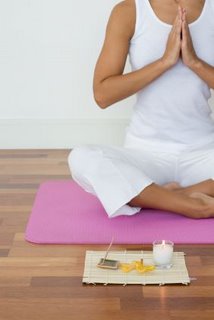 energizing yoga It’s three o’clock, and despite your novel-length to-do list, the only thing that holds your attention longer than 30 seconds is the thought of a caffeine or sugar fix. You’d get a better and more sustained boost, though, by practicing a midday meditation.
Typically associated with relaxation, meditation also jump-starts energy and clears a foggy head, says Eric Harrison, director of Australia’s Perth Meditation Centre and author of “Flip the Switch: 40 Anytime, Anywhere Meditations in 5 Minutes or Less.” “If you meditate consciously and don’t succumb to sleep, your mind becomes calm and clear,” he explains. And unlike the usual drowsiness cures, a few minutes of meditation can keep you alert all afternoon.
One of Harrison’s favorite quick meditations involves tuning in to the sounds we generally try to ignore, which gives the chattering mind a chance to rest. So close your office door or find a quiet space and follow these easy steps — and that cafe run might soon be a thing of the past.
 yoga at work Listening Meditation
Clear a space. Set your Zen Meditation Timer for 5 minutes. Take a moment to remove some of the clutter in your immediate area — mugs, scattered pens, loose papers. This helps you transition into meditation mode and sets the stage for a calmer, more productive afternoon.
Log off. Turn off your computer and silence the ringers on your work and cell phones. This limits physical distractions while freeing up your mind to focus on listening.
Close your eyes and normalize your breathing. Sit up straight and take long, deep, deliberate inhalations, followed by even longer exhalations. Continue this breathing throughout the entire exercise.
Begin listening. Tune in to the sounds around you as if you were listening to music. Let your ears explore both background and foreground noises. Are there any sounds you can hear now that you didn’t before? What’s the most distant sound you can hear? What’s the closest? What music or harmonies do they create together?
Notice your mood. Suspend any judgments about the sounds that normally irritate you, like the hum of the copier, and just listen.
Check your body. Locate any tense feelings within, and concentrate on relaxing each one of them.
When you hear the Zen Meditation Timer Chime, after several minutes, open your eyes. Notice the difference in your energy level. If you’re still feeling groggy, distracted, or unfocused, continue the listening meditation for a minute or two more.
adapted from Body + Soul, June 2007 by Donna Garlough
 maple zen timer for meditation and yoga
Now & Zen
1638 Pearl Street
Boulder, CO 80302
(800) 779-6383
Posted in Bamboo Chime Clocks, intention, Meditation Timers, Meditation Tools, mindfulness practice, Now & Zen Alarm Clocks, Well-being
 meditation improves attention New research shows that meditation can help you improve your ability to concentrate in two ways. First, it can make you better at focusing on something specific while ignoring distractions. Second, it can make you more capable of noticing what is happening around you, giving you a fuller perspective on the present moment.
Some of the most fascinating research on how meditation affects attention is being conducted by Antoine Lutz, PhD, an associate scientist at the Waisman Laboratory for Brain Imaging and Behavior at the University of Wisconsin at Madison, in collaboration with Richard Davidson and the Laboratory for Affective Neuroscience at the University of Wisconsin. Their work has shown that concentration meditation, in which the meditator focuses complete attention on one thing, such as counting the breath or gazing at an object, activates regions of the brain that are critical for controlling attention. This is true even among novice meditators who receive only brief training. Experienced meditators show even stronger activation in these regions. This you would expect, if meditation trains the brain to pay attention. But extremely experienced meditators (who have more than 44,000 hours of meditation practice) show less activation in these regions, even though their performance on attention tasks is better. The explanation for this, in Lutz’s view, is that the meditation training can eventually help reduce the effort it takes to focus your attention. “This would be consistent with traditional accounts of progress in meditation practice. Sustaining focus becomes effortless,” Lutz says. This suggests that people can immediately enhance concentration by learning a simple meditation technique, and that practice creates even more progress.
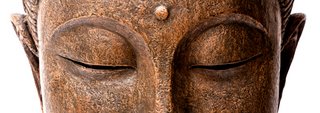 Buddha The researchers also looked at whether vipassana meditation training can improve overall attention. (Vipassana means “to see things as they really are,” and the meditation techniques are designed to increase focus, awareness, and insight.) Researchers label our inability to notice things in our environment as “attentional blink.” Most of us experience this throughout the day, when we become so caught up in our own thoughts that we miss what a friend says to us and have to ask her to repeat it. A more dramatic example would be a car accident caused by your thinking about a conversation you just had and not noticing that the car in front of you has stopped. If you were able to reduce your attentional blink, it would mean a more accurate and complete perception of reality—you would notice more and miss less.
To test whether meditation reduces attentional blink, participants had to notice two things occurring in rapid succession, less than a second apart. The findings, published in PLoS Biology, reveal that the meditation training improved the participants’ ability to notice both changes, with no loss in accuracy.
What explained this improvement? EEG recordings—which track patterns of electrical activity in the brain, showing precise moment-by-moment fluctuations in brain activation—showed that the participants allocated fewer brain resources to the task of noticing each target. In fact, the meditators spent less mental energy no-ticing the first target, which freed up mental bandwidth for noticing what came next. Paying attention literally became easier for the brain.
As a result, Lutz and his colleagues be-lieve that meditation may increase our control over our limited brain resources. To anyone who knows what it’s like to feel scattered or overwhelmed, this is an ap-pealing benefit indeed. Even though your attention is a limited resource, you can learn to do more with the mental energy you already have.
adapted from Yoga Journal, by Kelly McGonigal
 Zen Timepiece with brass singing bowl, a meditation timer Now & Zen
1638 Pearl Street
Boulder, CO 80302
(800) 779-6383
Posted in Bamboo Chime Clocks, intention, Meditation Timers, Meditation Tools, mindfulness practice, Now & Zen Alarm Clocks, Well-being, Yoga Timer
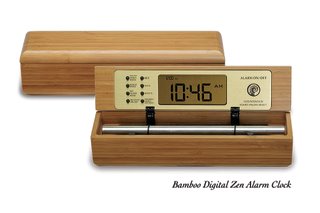 Wonderful, Soothing Chime Alarm Clocks Best Alarm Clocks:
Our Zen Alarm Clock Can Help You Wake-up on the Right Side of the Bed!
Weird and wonderful.
The Bamboo Digital Zen Clock’s long-resonating Tibetan bell-like chime makes waking up a beautiful experience – its progressive chimes begin your day with grace. When the clock’s alarm is triggered, the acoustic chime bar is struck just once … 3-1/2 minutes later it strikes again … chime strikes become more frequent over 10 minutes … eventually striking every 5 seconds until shut off. As they become more frequent, the gentle chimes will always wake you up – your body really doesn’t need to be awakened harshly, with a Zen Clock you’re awakened more gradually and thus more naturally.
 Sweetest Sounding Chime Alarm Clocks Now & Zen Headquarter Store
1638 Pearl Street
Boulder, CO 80302
(800) 779-6383
Posted in wake up alarm clock, Well-being, Zen Alarm Clock
« Previous Page — « Previous Entries
Next Entries » — Next Page »
|
|
|
|